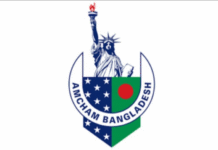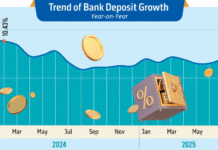By: Nazmul Ahsan
Finance Minister AMA Muhith will place the proposed budget for the fiscal year (FY), 2012-2013, in the Jatiya Sangsad (JS) today (Thursday).
The total outlay of the proposed budget is likely to be at the level of Tk 1917.38 billion, up by 17.20 per cent or Tk 281.49 billion, over that of the original budget of the outgoing fiscal.
The development expenditure for the forthcoming fiscal has been fixed at Tk 601.37 billion including an outlay of Tk 550 billion earmarked under Annual Development Programme (ADP).
Aggregate revenue collection under the proposed budget is likely to be targeted at Tk 1396.70 billion. At this level, the target about revenue earnings will be Tk 213.85 billion — or 18.06 per cent — higher than what was projected in the original budget for the outgoing fiscal.
The budget deficit for FY 2012-2013 will be around Tk 520.68 billion, which is equivalent to five per cent of Gross Domestic Product (GDP), according to reliable sources.
The domestic borrowing to meet budget deficit is likely to be sized at Tk 334.84 billion. Out of this total, Tk 230 billion will be sourced from the banking system, Tk 74 billion will come as net receipts from sales of savings instruments and the remaining Tk 30.84 billion will be borrowed under other head of receipts under the Public Account of the Republic, a top finance ministry official said.
The proposed budget for FY 2012-2013 is likely to set the target about external aid disbursement at Tk 203.98 billion, notwithstanding very low level of external aid availability for budgetary financing in the outgoing fiscal.
The foreign aid availability for budgetary resource management in the upcoming fiscal is, thus, estimated to be Tk 73.62 billion higher than the amount in the revised budget for the outgoing fiscal. The revised budget for FY 2011-12 estimated the disbursement of external aid at Tk 140.36 billion, short of Tk 46.49 billion from the original budget estimate of Tk 186.85 billion, according to sources.
Economists have, meanwhile, pointed to a number of emerging challenges in implementing the next budget. Such challenges include, among others, implementation of foreign-aided projects, taming the inflationary rate, minimising income inequality, addressing the issues relating to the existing unsatisfactory investment situation and eliminating the nagging power and infrastructure problems in the country to achieve the budgetary targets of the forthcoming fiscal.
The budget for FY 2012-13 will be Mr Muhith’s fourth one as the finance minister of the incumbent government. In the backdrop of the point-to-point inflation still remaining at 9.15 per cent in May this year, the proposed budget will aim at lowering this rate to 7.5 per cent in the upcoming fiscal.
Of the total projected revenue receipts, Tk 1122.59 billion will be collected by National Board of Revenue (NBR), Tk 228.46 billion will come as non-tax revenues and the rest Tk 45.65 billion, from non-NBR portion of duties and charges in FY 2012-2013, the indications suggested.
The NBR portion of tax collection will include Tk 353 billion as income tax, Tk 404 billion as Value Added Tax (VAT), Tk. 356 billion as import duty (including supplementary duty) and Tk 9.59 billion on account of other taxes.
The proposed budget is likely to allocate about Tk 350 billion as the subsidy bill. Agriculture, petroleum, power and state-owned enterprises will get the bulk amount of this subsidy, sources said.
The proposed budget is likely to offer facilities for disclosure of untaxed (black) money for investment in stock market, infrastructure bond, real estate etc. sectors under various terms and conditions.
Under the proposed budget, then will be expanded coverage of Value Added Tax (VAT), additional duties on imported reconditioned vehicles, enhanced rates of fees for registration of vehicles, vehicle fitness certificates, increase fees, duties, charges, etc., relating to transactions, mutations and other certificates concerning landed property, hikes in bridge toll and narcotics tax.
However, the existing arrangement for deduction of tax at source on incomes from savings instruments is likely to be withdrawn under the proposed budget.
Meanwhile, former Governor of Bangladesh Bank (BB) Dr Salehuddin Ahmed told the FE that the upcoming budget would face challenges in areas of providing funds for subsidies, improving the investment climate and addressing the problem of existing huge unemployment.
The finance minister should not opt for indirect taxes in his new fiscal measures as such taxes always hit badly the common people, he observed.
The former central bank governor also made strong pleas for taking strong pro-active policy moves under the proposed budget to help reduce income disparity at both individual and regional levels.
He also stressed the need for convergence of both fiscal policy of the government and monetary policy of the central bank, in order to rein in inflation.
Talking to the FE, the Executive Director of Centre for Policy Dialogue Dr Mustafizur Rahman said the next budget would face at least six to seven major challenges.
These include keeping up the momentum of revenue mobilisation, implementation of a large-sized ADP, ensuring the projected foreign aid disbursement to implement externally-aided development projects, proper execution of large infrastructure projects particularly in power and energy sectors, guaranteeing cost-plus remunerative prices for agriculture goods for producers, maintaining price stability for the well-being of the average citizens, enhancing export competitiveness and providing access to credit on the part of small and medium enterprises, he added.
Source: The Financial Express









